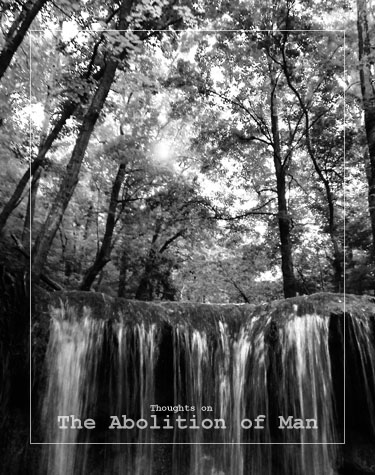
Volume X, Issue VI
Hillsdale College is offering an online course on the works of C. S. Lewis [click to read].The first lecture is by the President of the College, Dr. Larry Ahrnn, who takes us rather rapidly into the basic premise of The Abolition of Man, a short (three chapters) work by Lewis. He cites the authors of a book on English grammar, who observe two men observing a waterfall. One calls it 'pretty,' the other says that it is 'sublime.'
The authors make a statement that one who says that the waterfall is beautiful is not making a statement on the intrinsic value of the waterfall itself, but rather to the feelings about the waterfall that reside inside him. This is key, because Lewis goes on to say that the authors are not making an observation about grammar now, but are putting forth a certain philosophy.
Lewis' larger point is that the authors are really making a pretty sweeping statement: they are claiming that there are 'facts', and there are 'mere feelings'. By 'facts', they mean, anything that doesn't contain a value judgement. So, anytime someone has an opinion about something, that person isn't actually talking about anything that is 'true' or 'real', he is just saying fluff, just speaking meaningless words. Lewis disagrees and says that things in the real world have certain intrinsic qualities about themselves, and that everyone knows and recognizes this. Two people argue whether a painting is beautiful, because both of those people are trying to grasp the true nature of the thing. In fact, people wouldn't argue about anything unless they had some external, objective reference to which they were both referring, both trying to ascertain." -- Sam Selikoff [1.]
Lewis observes a fundamental problem that we who believe in truths have in today's world. As Selkoff points out: "Things either have an objective nature or they do not; and if they do not there is no way to argue the point." Lewis, who calls the true nature of all things the Tao, observes that all societies and peoples will agree to SOME notion of objective reality, even as the textbook writers seek to deny it. Lewis points out that the writers actually are picking and choosing parts of the Tao arbitrarily, based on their own feelings.
Taking a point from Horace, Lewis suggests that man, stepping outside the guidance of the Tao, now has no 'grammar' of moral guidance to hand to future generations. Predicting that such rudderless philosophy will lead to "the Abolition of Man," Lewis predicts, rather frighteningly, modern education and popular culture's descent into discussions of self-proclaimed identity and 'tolerance/tribalism' over timeless truths. In fact, the selective reasoning is quick to dismiss any truth that is 'inconvenient' (such as a moral absolute), and replacing it with more 'timely' issues such as 'climate change.'
In light of Lewis' observations, one can easily see how someone might argue that there is no judgement to be placed on refugees before they are admitted to this country. Horace's noble point about protecting one's own countrymen is relegated to the ash heap and the one invoking Horace's ideals is indeed seen as 'uncompassionate!' (remember: you get to pick and choose now). Such is the landscape before us as we attempt to lead our fellows toward that Celestial City. We cannot expect them to follow the signs they have been told are meaningless. Those they see as the 'keepers of the Tao' have already selected for them.
That is the challenge before us, as people of Faith who are artists and writers. The challenge to once again lead our fellows to the sublime waterfall! "To Narnia and the North!," I say.

A sublime waterfall.
